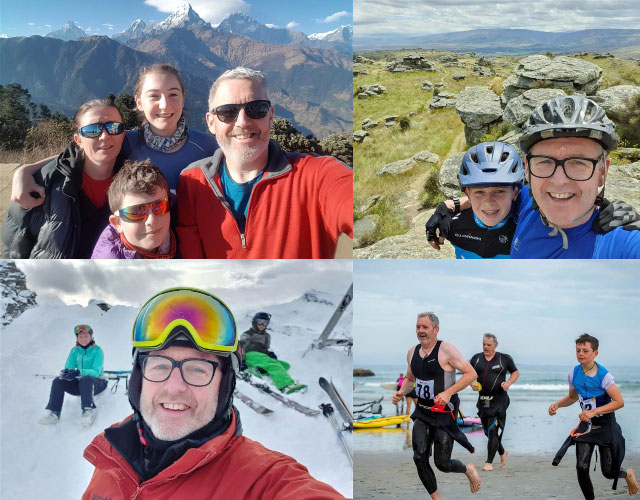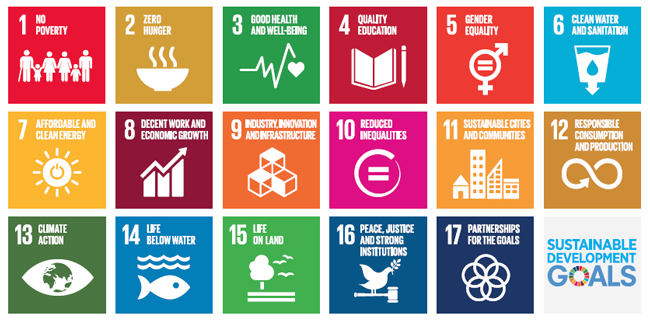
The new head of Otago's Sustainability Office Ray O'Brien with his family.
Ray O'Brien's relaxed Scottish banter belies a focused, pragmatic approach that has seen him repair a kayak with a plastic film canister and prescription sunglasses while paddling the deepest canyon on the planet.
The only way out of the Andean gorge was to keep kayaking, so he shaved plastic from the canister then directed the sun's energy through the prescription lens to melt the plastic onto the kayak.
Getting into wild places on rivers and mountains from a young age organically sparked an interest in sustainability and led to him becoming head of the University's Sustainability Office.
“It's woven right through (my life), you can't spend that much time in wonderful parts of the world without placing a higher value on it. You build a special relationship with the planet and always working out how can we tread more lightly?”
"If sustainability was simply 'do this, don't do that' we would've been where we need to be years ago."
That is not an easy question to answer. Sustainability is such a broad field the problems are complex – “they're wicked” – because solving one issue could create another one, for example how can we tackle world hunger without more intensive farming adversely affecting the environment?
“If sustainability was simply 'do this, don't do that' we would've been where we need to be years ago,” Ray says.
Brought up on the west coast of Scotland and the first in family to go to university, Ray is firmly focused on results and pragmatic practical solutions that are tailored to work for people in the long-term – sustainable solutions.
Reaching those solutions is a journey of learning and Ray's natural interest in people has evolved into a continuous journey of his own, studying the most effective ways to learn so leaners can create their own impact.
His Bachelor of Arts in Human Resource Management was followed by a Postgraduate Certificate in Education, a Graduate Diploma in Teaching (Secondary), and a Master of Education. Now, he is studying for a Doctor of Professional Practice.
“If I was to distil what I believe education should be into a few words it would be: authentic, action orientated, and purpose driven,” Ray says.
His work has included everything from corporate training, instructing at Outward Bound and teacher training in Nepal to running programmes for young people leaving drug and alcohol rehabilitation.
“I am committed to the big purpose of education, transformational change for a better world – by developing capability, designing learner experiences and creating innovative projects.”
A significant stage in Ray's working life was at the Joint Services Mountain Training Centre in the United Kingdom, where he developed military personnel's leadership and other capabilities through adventure training. He spent winters in Norway each year developing their capabilities in challenging and risky environments.
Apparently, that wasn't as unpleasant as it sounds: “It's way more comfortable in a Norwegian minus 20 degrees than in a rainy Dunedin eight degrees because it's so dry.”
Then he and his wife had their first child.
Being away from home for so long each year was not an option, nor was being unable to give maximum enthusiasm to his job: “I always said I would never be a blocker and stop someone else coming in, so I stepped away from the outdoors (professionally) at that point”.
The trio went on a year's sabbatical to New Zealand, because they love the Wanaka area.
They had only been there three months when Ray told his military workplace he would not be returning, “but it took the rest of the year to tell my mum and dad. At that time, we had the only grandchild on both sides of the family”.
For about five years Ray and his wife each worked half-time as their family grew by one: “I went from the top of the tree to doing odd jobs. It was a really good time to prioritise and put family first.”
"I am committed to the big purpose of education, transformational change for a better world – by developing capability, designing learner experiences and creating innovative projects."
As the couple's oldest child was due to start high school, the family moved to Dunedin for more school choices and Ray joined a learning design team at the Otago Polytechnic, where he ultimately became a sustainable practice learning and teaching specialist.
When the University's sustainability job came up, he saw it as “a huge opportunity to have scale of impact because of the size of the organisation – and it's at the stage of readiness to want to make a difference with sustainability.”
In his interview for the job, Ray presented a plan for what he would like to achieve in his first year and has achieved the targets for the first 30 days, including meeting a host of people across the University and its campuses.
For the rest of the year, his focus includes:
- Connecting the three points of the sustainability triangle – research, student learning and operations
- Creating a sustainability excellence teaching award
- Ensuring our University progresses more towards active and sustainable travel
- Gathering a regular forum of people working towards sustainability to exchange ideas
- Having a model for a sustainable office
- Initiating the Sustainability Tracking Assessment and Rating System (STARS), a measure created by The Association for the Advancement of Sustainability in Higher Education
- Recruiting a Net Zero Carbon Manager, to coordinate the University's journey to that target
- Starting the University's Sustainability Taskforce and Advisory Group that will support, coordinate and advocate for the Sustainability Office's work
His approach is to move away from negativity and eco-anxiety towards telling stories about positive actions because “that creates long-term behaviour change”.
“I think that's where the United Nation's 17 Sustainability Goals come in because they are so broad they actually identify something that everybody cares about.”

Ray sees one of the biggest opportunities in his new job as the collaboration possible across our University's areas of expertise; academic, operational and student-led.
“If we get all these minds working together, we're going to get closer to solutions,” he says.